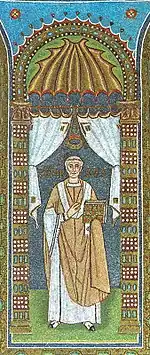Saint Ursus | |
|---|---|
 Mosaic portrait of Ursus in the Basilica of Sant'Apollinare in Classe, Ravenna | |
| Bishop of Ravenna | |
| Born | Sicily |
| Died | 13 April 396 Ravenna |
| Venerated in | Roman Catholic Church, Eastern Orthodox Church |
| Canonized | Pre-congregation |
| Feast | 13 April |
| Patronage | Against faintness and kidney disease |
Ursus (Italian: Orso, died 13 April 396) was bishop of Ravenna during the late 4th century.
Biography
Ursus was born into a noble pagan family in Sicily but fled to Ravenna due to his family's anger with his conversion to Christianity.[1] He was elected bishop following the death of Liberius III and held the position for 26 years.[2] He is best known as the founder of the Ravenna Cathedral, which was named Basilica Ursiana in his honor. Ursus's cathedral was demolished and rebuilt in the 18th century.[3] According to Andreas Agnellus, he died on 13 April on Easter Sunday, and he was buried at the Basilica Ursiana.[2]
The dates of Ursus's tenure as bishop are a subject of some dispute. While some historians place it at 370–396, with the foundation of the Basilica Ursiana in 385, others place it at c. 405–431 to account for claims that he was directly succeeded by Peter Chrysologus.[4]
.jpg.webp)
References
- ↑ Stracke, Richard (2016). "The Saints Named Ursus in Art and their Iconography". www.christianiconography.info. Retrieved 2023-07-16.
- 1 2 Agnellus of Ravenna; Deliyannis, Deborah Mauskopf (2004). The Book of Pontiffs of the Church of Ravenna (Medieval Texts in Translation). Catholic University of America Press. pp. 118–120. ISBN 978-0-8132-1358-3. JSTOR j.ctt284wdr.
{{cite book}}: CS1 maint: date and year (link) - ↑ Herbermann, Charles, ed. (1913). . Catholic Encyclopedia. New York: Robert Appleton Company.
- ↑ Hutton, Edward (1913). Ravenna: A Study. New York: E. P. Dutton. pp. 161–163. ISBN 978-1-4142-3287-4.
{{cite book}}: CS1 maint: date and year (link)